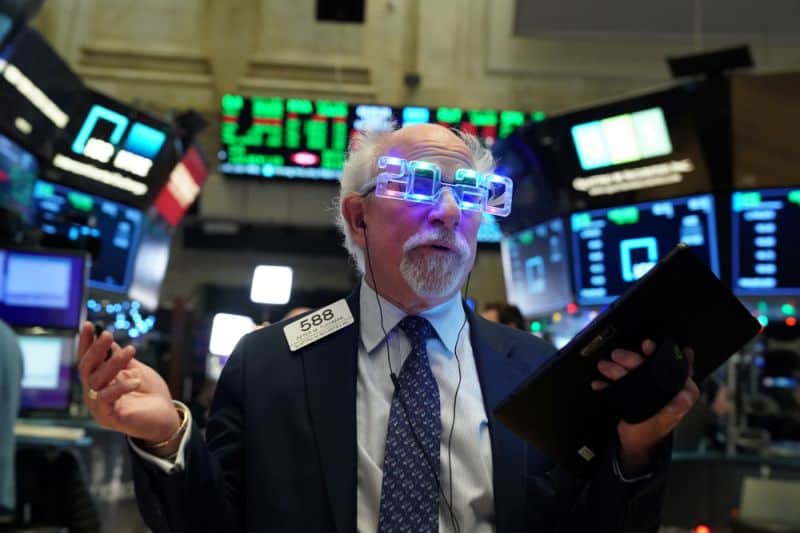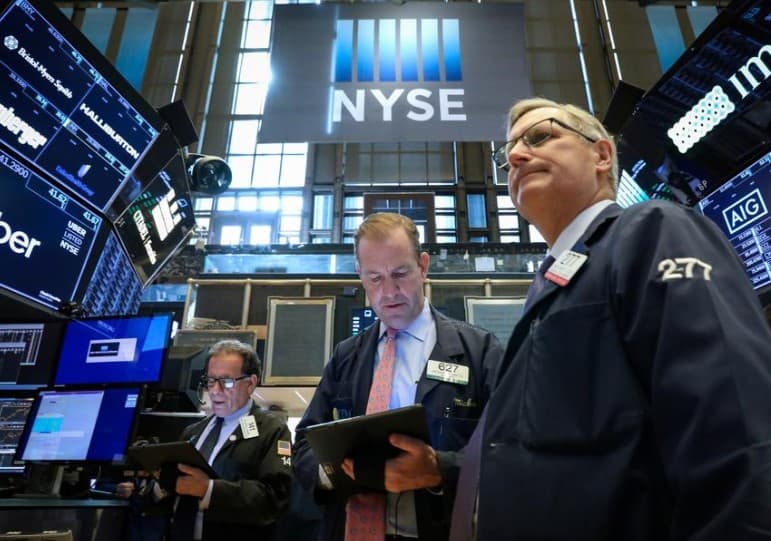
4 p.m. ET: Stocks close at record highs; Dow rises 300+ points
Stocks rallied Thursday to kick off the new year. All three indices closed at record highs with tech leading the charge. Tech giant Apple (AAPL) hit all-time highs and closed above $300 per share for the first time ever.
Here’s how the markets settled at the end of Thursday’s session:
- S&P 500 (^GSPC): 3,257.85, up 27.07 points or 0.84%
- Dow (^DJI): 28,868.80, up 330.36 points or 1.16%
- Nasdaq (^IXIC): 9,092.19, up 119.58 or 1.33%
- Crude oil (CL=F): $61.14 per barrel, up $0.08 or 0.13%
- Gold (GC=F): $1,530.70 per ounce, up $7.60 or 0.50%
2:43 p.m. ET: AMD reaches all-time high
Advanced Micro Devices (AMD) rose 6.8% to hit $48.96 marking an intraday record for the first time since 2000, Bloomberg reports. According to Bloomberg, the gains came after Nomura Instinet raised its price target for AMD to $58.
12:45 p.m. ET: Stocks add to gains as rally rolls on
If investors are uncertain what this year will bring, it’s not being reflected in the price action of 2020’s first full trading day. Blue-chip and tech shares are perched near session highs, with the Dow adding over 200 points at midday:
- S&P 500 (^GSPC): 3,244.39, up 12.87 points or 0.40%
- Dow (^DJI): 28,651.35, up 203.23 points or 0.71%
- Nasdaq (^IXIC): 9,045.47, up 68.13 or 0.76%
“I suspect the S&P 500 will end the year 10% to 12% higher than we are today,” Invesco global markets strategist Brian Levitt told Yahoo Finance’s “The First Trade” on Thursday.
“I am not expecting this to be a year where we are up 20%, 30%, but this is a year where markets should continue to move higher — and I would say the risk to that outlook is probably higher,” he added.
9:45 a.m. ET: Markit U.S. Manufacturing PMI
IHS Markit final U.S. Manufacturing Purchasing Managers’ Index (PMI) reading ticked slightly lower to 52.4 during the month of December, from 52.6 in November. December’s data illustrated a sustained improvement in operating conditions in the manufacturing sector, accoding to IHS Markit.
“The latest data indicated a modest improvement in the health of the U.S. manufacturing sector. The final quarterly average of 2019 was in fact the strongest since the opening three months of the year,” IHS Markit said in a statement.
9:30 a.m. ET: Stocks open higher, Dow surges 100+ points
Stocks soared at the open Thursday on the first trading day of the new year.
Here were the main market moves, as of the market open:
- S&P 500 (^GSPC): 3,244.39, up 13.61 points or 0.42%
- Dow (^DJI): 28,651.35, up 112.91 points or 0.40%
- Nasdaq (^IXIC): 9,045.47, up 72.87 or 0.81%
- Crude oil (CL=F): $61.15 per barrel, up $0.09 or 0.15%
- Gold (GC=F): $1,531.10 per ounce, up $8 or 0.53%
8:30 a.m. ET: Initial jobless claims tick lower
The U.S. Labor Department announced Thursday morning that 222,000 Americans filed for unemployment benefits the week ended Dec. 28. The prior week’s figure was revised upward to 224,000 from 222,000 claims previously reported. Economists surveyed by Bloomberg expected initial jobless claims to total 220,000 for the week.
8 a.m. ET: Stock futures indicate higher open
U.S. stock futures pointed to a higher open for the major indices Thursday on the first trading day of the new year.
Here were the main pre-market moves, as of 8 a.m. ET:
- S&P futures (ES=F): 3,249, up 18 points or 0.56%
- Dow futures (YM=F): 28,667, up 159 points or 0.56%
- Nasdaq futures (NQ=F): 8,815, up 62.75points or 0.72%
- Crude oil (CL=F): $61.05 per barrel, down $0.01 or 0.02%
- Gold (GC=F): $1,525.70 per ounce, up $0.04 or 0.17%
2019’s stock market rally looks to continue into 2020. Last year, stocks logged their best year since 2013 with the S&P 500 (^GSPC) rising 28.9%, Dow (^DJI) jumping 22.3% and the Nasdaq (^IXIC) gaining 35%.
Meanwhile, global stocks got a boost after China’s central bank announced in a statement Wednesday it was cutting the reserve requirement ratio for commercial banks in the country. The move means that banks will be required to hold less cash on hand for emergencies, and thus, will free up around 800 billion yuan, which can then be invested into China’s economy. The cut was the fourth such cut over the past 12 months.
























